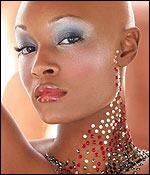 What
you should know about hair loss?
What
you should know about hair loss?
Scalp hair is considered an essential part of appearance in
both men and women. Given our society's emphasis on looks
and beauty, it should be no surprise that hair loss is viewed
with great concern by many people.
The medical term for baldness is alopecia. When patchy baldness
appears as a chronic condition, it is referred to as alopecia
areata.
Let's take a look at some basic facts relating to hair loss.
Hair can be in a growing phase or in a rest phase. The growth
phase lasts anywhere from two to six years. This is followed
by a rest phase where the hair is not growing and is basically
nearing the end of its life-cycle.
Research has shown that roughly 10% of scalp hair is in a
rest phase at any point of time. This hair will typically
fall out in about two to four months' time. It will then be
replaced by new hair that grows in its place.
Hair strands on the scalp grow at an average rate of one centimeter
a month. Nine out of ten strands of scalp hair are in a growth
phase at any given point.
It is entirely normal for both men and women to lose some
hair every day. This is the hair belonging to the 10% rest
phase group. Hair loss problems occur when the rate of loss
of hair exceeds normal levels.
Hair loss is often thought to be a bigger problem for men
than for women, but it can occur in both sexes. It can even
occur in children - there is no specific age group that is
never affected by hair loss.
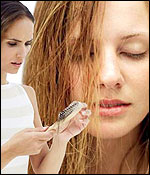 What
causes hair loss?
What
causes hair loss?
Many different factors may be responsible. Stress induced
by illness can be a reason. For instance, some people lose
a lot of hair within a few after they have surgery of any
kind. This is usually because of the stress associated with
the disease and the surgery. Hair loss in such cases is usually
temporary and the hair tends to grow back over time. However,
losing significant amounts of hair over a fairly short time
frame can be an unsettling experience for the person concerned.
Hormonal imbalances can cause hair loss. If the estrogen -
androgen balance in the body is upset, hair loss may be one
of the results observed. The same thing can occur when the
thyroid gland becomes over/under-active. In such cases, rather
than treat the hair loss per se, it will be necessary to treat
the underlying cause, which is the thyroid gland function
or the hormone balance issue.
Women may lose hair following childbirth. During pregnancy,
hormone levels in a woman's body are elevated and as a result,
hair that would normally fall out is retained. After delivering
the baby, her hormone levels return to normal. Then the hair
growth and loss cycles also return to normal causing her to
lose hair.
Many types of medication result in hair loss as one of their
side effects. In such cases, the hair loss problem may be
cured when the patient stops taking the drug. Some examples
of such medication include contraceptive pills, anticoagulants
(or blood thinners), high doses of vitamin A, chemotherapy
drugs (these are notorious for causing loss of hair), gout
medication, antidepressants and many more.
Infections can cause hair loss too. Children may occasionally
get fungal infections on the scalp, which causes loss of hair.
Such infections can be treated fairly easily and the hair
usually grows back after the infection clears up. In addition,
diseases like lupus and diabetes can cause hair loss as well.
In fact, hair loss is often considered a symptom of these
diseases. That's why it is important to uncover the real causes
of hair loss.
Hair that is not well cared for can fall out too. Some hair
styles like pigtails and tight rollers cause hair to be pulled
outwards, resulting in a condition called traction alopecia.
Problems relating to this condition can be prevented if stress
on the scalp is stopped before the scalp becomes scarred.
If the scalp has been scarred, it may result in permanent
loss of hair.
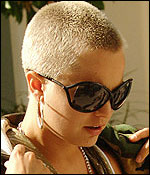 Facts
about female hair loss!
Facts
about female hair loss!
Female hair loss is spoken about a lot less as compared to
male-pattern hair loss. Nevertheless, it is a fairly common
problem in America and the rest of the world. In our beauty-conscious
age, female hair loss can be a devastating experience for
the affected woman. It often leads to other issues like lowered
self-esteem.
Female hair loss can occur for many different reasons. It
is important to know what some of these are. Preventive steps
can help at least to some extent. In any case, they can give
the woman a feeling of control over her problem, which can
help her feel better about it.
The hormone estrogen has a key role to play in hair loss in
females. As a woman ages, estrogen production in her body
slows down. This has a multitude of effects on her body, including
a general slowing down in various body functions. The scalp
and hair are among the affected areas.
The natural processes of hair production slow down with lower
estrogen levels. The body responds by not channeling enough
nutrients for hair production. This is why some women experience
hair loss as they age.
Genetics is another factor thought to be a strong influence
on female hair loss. A woman is more likely to experience
hair loss of either of her parents has had thinning hair or
a hair loss problem. With age, protein production in the body
decreases, which can lead to lower hair growth. Hence hair
loss becomes more obvious with age.
Hair growth and maintenance depends on the nutrient levels
in the body. If these levels change or are inadequate, it
can affect the scalp and hair. This is why diet has a significant
influence on female hair loss.
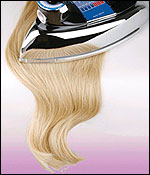
An unbalanced diet or one that does not have enough of the
right nutrients can result in hair loss (among many other
problems.) It has been observed that increasing the protein
content in the diet can help alleviate hair loss, although
it is usually only a temporary effect.
Apart from the above, there are many diseases that can cause
hair loss as well. When you consult a doctor about your hair
loss problem, he or she will try to find out if there is any
underlying disease or health condition that is the real cause
of the hair loss symptom. Often, when a medical condition
clears up, the hair loss problem clears up also.
Several other factors may also cause female hair loss. Some
people say that using hair coloring products, various kinds
of hair styling products, highlighting, etc can lead to hair
loss. However, this has not been conclusively proven. Usually,
such products can at most affect the outer portion of the
hair. They do not affect the roots and so the hair continues
to grow out from the roots will be normal.
Female hair loss sufferers should remember that they are not
alone in their problem. There are literally millions of women
around the world who face the same situation. Investigation
by a medical professional can unearth the real roots of the
problem which must then be dealt with.
10 tips you can use for Hair loss prevention!
Are there hair loss prevention approaches that are always
effective? Unfortunately, the answer is no. Chronic baldness,
or alopecia areata, usually cannot be prevented. Likewise,
hair loss resulting from certain medical conditions cannot
be prevented either.
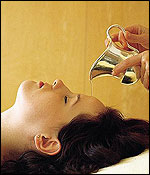
However, hair loss can arise due to a number of different
factors. And some of those factors can be controlled. Therefore,
hair loss prevention is quite feasible in many instances.
In any case, it is easier to prevent hair loss than to try
to re-grow hair from dormant follicles. That is why hair loss
prevention measures are important for maintaining healthy
hair.
Here are 11 ways you can prevent hair loss.
1) Some cases of hair loss are caused by fungal infections
like tinea capitis, which are highly contagious. Such infections
can be avoided by not sharing hair brushes, combs or hats.
It is particularly important to remind children to avoid sharing
these items, whether at home or elsewhere.
2) Adolescent girls often share makeup with others. This can
result in transmitting infections as well and should be avoided.
3) Wet hair is more fragile than dry hair. Therefore, do not
vigorously towel-dry the hair after a shower or at other times
when the hair is wet. Likewise, avoid rough combing or brushing
on wet hair.
4) Do not use combs or brushes with narrow teeth or sharp,
pointed teeth. Use wide toothed brushes and combs that have
smooth tips. This is a simple, yet effective hair loss prevention
measure.
5) Hair should be treated gently and with care when using
chemical processes on it. The same applies when hair is being
shampooed, dried, braided or brushed.
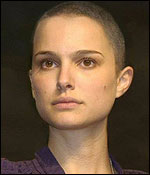
6)
Hair is mostly made of protein. Therefore, if a person's diet
is protein-deficient, it can result in thinning hair and an
impaired hair growth cycle. A diet with adequate protein levels
can help hair growth. Foods like eggs, lean meat, fish, etc
are useful for this purpose.
7) Nutrition is a very important factor in hair loss prevention.
Thinning hair can be the result of various nutritional deficiencies.
Biotin, vitamin B6 and folic acid are important components
of the diet that promote healthy hair. In some cases, it may
be necessary to take dietary supplements that contain these
nutrients. Beta carotene is another important factor that
affects hair as well as many other body organs. Fruits as
well as green and yellow vegetables are rich in beta carotene.
8) Certain minerals are also essential for maintaining hair
growth. They include zinc, magnesium silica and sulfur.
9) Reduction is stress levels is said to be useful for slowing
down hair loss. This can of course, give many other physical
and mental benefits as well. It is a good idea to have a medical
professional design an exercise program and diet that can
reduce stress, increase overall health and slow down hair
loss in the bargain.
10) Aerobic exercise done regularly is said to help with hair
loss problems as well. Aerobic activity can reduce stress
levels, giving significant health benefits apart from maintaining
healthy hair.
11) A herb called Polygonum Multiflorum is a traditional remedy
for hair loss. Some people have found it quite effective.
If you experience a sudden increase in hair loss, it is best
to consult a doctor to find out why it's happening. It is
possible that some underlying medical condition may be causing
the problem. If so, that condition must be treated rather
than just the hair loss.

12)
Avoid over consumption of salt (most vegetables have their
own natural sodium) and sugar; skip them entirely, if possible.
13) Same with alcohol and tobacco, also contributing causes
of hair loss and dandruff.
14)A correlation has been drawn between excess stress and
hair loss, even among modern teenagers, so do try to reduce
stressors in your life, as much as possible. Using your wisdom
in finding ways to manage stress is fundamental to achieving
better hair and skin vitality, not to mention the other psysiological,
psychological and spiritual payoffs.
15) Almost 50% of European and upper middle class women now
coloring their hair, manufacturers have perfected far-less-damaging
products, although do avoid the hottest settings of hair-curlers,
curling irons and hair-dryers, both to prevent hair damage,
as well as avoid skin burning.
If you experience a sudden increase in hair loss, it is best
to consult a doctor to find out why it's happening. It is
possible that some underlying medical condition may be causing
the problem. If so, that condition must be treated rather
than just the hair loss.
Ultimately, hair loss prevention is about maintaining overall
health. A balanced diet, exercise and sensible habits are
all factors that go into maintaining healthy, attractive hair.



